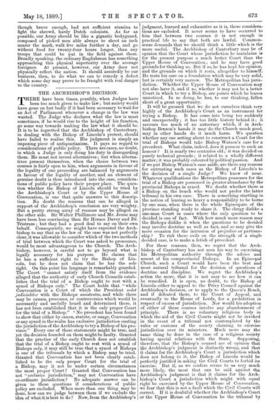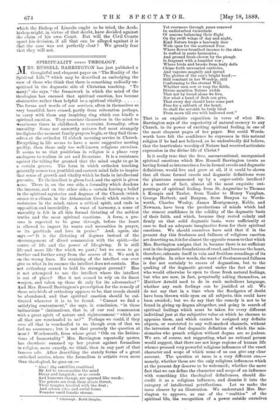THE ARCHBISHOP'S DECISION.
RE have been times, possibly, when Judges have been too much given to make law ; but society would have gone on but badly if it had been necessary to wait for an Act of Parliament whenever a change in the law was wanted. The Judge who declares what the law is must sometimes, if he would rise to the height of his function, go some way towards making the law what it should be. It is to be regretted that the Archbishop of Canterbury, in dealing with the Bishop of Lincoln's protest, should have failed to realise this. His judgment is simply an imposing piece of antiquarianism. It pays no regard to considerations of public policy. There are cases, no doubt, in which a Judge is only doing his duty in disregarding them. He must not invent alternatives ; but when alterna- tives present themselves, when the choice between two courses is fairly open to him, when arguments in favour of the legality of one proceeding are balanced by arguments in favour of the legality of another, and an element of genuine doubt is thus introduced into the case, considera- tions of public policy have their proper place. The ques- tion whether the Bishop of Lincoln should be tried by the Archbishop's Court or by the Upper House of Convocation, is one that quite answers to this d.escrip- tion. No doubt the reasons that can be alleged in support of the Archbishop's conclusion are very weighty. But a pretty strong array of reasons may be alleged on the other side. Sir Walter Phillimore and Mr. Jeune may have been less convincing than Sir Horace Davey and Dr. Tristram ; but they had a good deal to say on their own behalf. Consequently, we might have expected the Arch- bishop to say that as the law of the case was not perfectly clear, it was allowable to consider which of the two methods of trial between which the Court was asked to pronounce, would be most advantageous to the Church. The Arch- bishop, however, is careful not to go beyond what is legally necessary for his purpose. He claims that he has a sufficient right to try the Bishop of Lin- coln, but he does not claim that he has the sole right. On this point his language is remarkably guarded. The Court "cannot satisfy itself from the evidence alleged that the authority of early Church Councils estab- lishes that the trial of a Bishop ought to rest with a synod of Bishops only." The Court holds that "while Convocation is a Court of which the President sedet judicialiter with the Bishops assistentes, and while there may be causes, processes, or controversies which would be necessarily and usefully heard and determined there, it has not been established that it is the only proper Court for the trial of a Bishop." "No precedent has been found to show that either by canon, statute, or usage, Convocation or any synod in the realm has exclusive jurisdiction ousting the jurisdiction of the Archbishop to try a Bishop of his pro- vince." Every one of these statements might be true, and yet the decision founded on them might be faulty. Granted that theY practice of the early Church does not establish that the trial of a Bishop ought to rest with a synod of Bishops only, it may still be true that a synod of Bishops is one of the tribunals by which a Bishop may be tried. Granted that Convocation has not been clearly estab- lished to be the only proper Court for the trial of a Bishop, may it not be under certain circumstances the most proper Court? Granted that Convocation has not "exclusive jurisdiction," may not Convocation have co-ordinate jurisdiction ? No adequate answer can be given to these questions if considerations of public policy are excluded. When more than one thing may be done, how can we judge between them if we exclude the idea of what it_is best to do ? Now, from the Archbishop's judgment, learned and exhaustive as it is, these considera- tions are excluded. It never seems to have occurred to him that between two courses it is not enough in practical life to say that both are lawful. Common- sense demands that we should think a little which is the more useful. The Archbishop of Canterbury may be of opinion that the Court whose jurisdiction he maintains is for the present purpose a much better Court than the Upper House of Convocation ; and he may have good grounds for thinking so. But if so, he has kept his opinion, and the grounds on which it rests, altogether to himself. He rests his case on a foundation which may be very solid, but is certainly very narrow. The Metropolitan has juris- diction. Whether the Upper House of Convocation may not also have it, and if so, whether it may not be a better Court in which to try a Bishop, are points which he leaves unnoticed. In so doing, he has, to our thinking, fallen short of a great opportunity.
It will be guessed that we do not ourselves think very highly of the Archbishop's Court as an instrument for trying a Bishop. It has come into being too suddenly and unexpectedly ; it has too little history behind it ; it savours too much of an autocracy which, if in Arch- bishop Benson's hands it may do the Church much good, may in other hands do it much harm. We question whether any one setting about to construct a Court for the trial of Bishops would take Bishop Watson's case for a precedent. What claim, indeed, does it possess to such an honour ? It is nearly two centuries old ; it was decided on purely technical grounds ; it related to a wholly different matter; it was probably coloured by political passion. And if we put Bishop Watson's case aside, are there any reasons for entrusting such cases as the Bishop of Lincoln's to the decision of a single Judge ? We know of none. Whatever qualifications the Metropolitan possesses for the trial of a Bishop are possessed in greater abundance by the provincial Bishops in synod. We doubt whether there is a Bishop on the bench who would not prefer the latter tribunal in his own case. There is something startling in the notion of leaving so heavy a responsibility to be borne by one man, when there is the whole Episcopate of the province standing ready to share it. The clergy dislike a one-man Court in cases where the only question to be decided is one of fact. With how much more reason may the Bishops dislike it when the questions to be decided may involve doctrine as well as fact, and so may give the more occasion for the intrusion of prejudice or partisan- ship ? To risk these evils on the strength of a single decided case, is to make a fetish of precedent.
For these reasons, then, we regret that the Arch- bishop of Canterbury has not seen his way to exercising his Metropolitan authority through the advice and assent of his comprovincial Bishops. In an Episcopal Church, such a. Court would have been the best and most natural tribunal for the decision of questions of doctrine and discipline. We regret the Archbishop's action the more, that it is not easy to see how it can be remedied. It is open, no doubt, to the Bishop of Lincoln either to appeal to the Privy Council against the Archbishop's decision, or to apply to the Queen's Bench, and if defeated there, to the Court of Appeal, and eventually to the House of Lords, for a prohibition in respect of excess of jurisdiction. Nor would his adoption of either of these courses involve any abandonment of principle. There is no voluntary religious body in which the aid of the Civil Courts might not be invoked in the event of a tribunal not contemplated by the rules or customs of the society claiming to exercise jurisdiction over its ministers. Much more may the same thing be done in the case of a religious society having special relations with the State. Supposing, therefore, that the Bishop's counsel are of opinion that the Archbishop's judgment is distinctly wrong, and that it claims for the Archbishop's Court a jurisdiction which does not belong to it, the Bishop of Lincoln would be perfectly justified in asking the Civil Courts to forbid its exercise. But if, as we confess seems to us very much more likely, the most that can be said against the Archbishop's judgment is that it claims for the Arch- bishop's Court a jurisdiction 'which might with equal right be exercised by the Upper House of Convocation, we fear that this is not a fault which the Civil Courts will correct. If it is doubtful whether the Archbishop's Court or the Upper House of Convocation be the tribunal by
which the Bishop of Lincoln ought to be tried, the Arch- bishop might, in virtue of that doubt, have decided against the claim of his own Court. But will the Civil Courts upset his decision, if all that can be alleged against it is that the case was not perfectly clear ? We greatly fear that they will not.



































 Previous page
Previous page